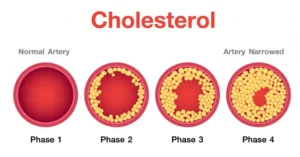The word cholesterol may immediately conjure up images of clogged arteries or lab reports circled in red. You may associate cholesterol with negative health outcomes because it frequently gets a bad rap. But in fact, cholesterol serves an important role in our bodies, such as creating new cells and helping produce hormones.
Your body needs cholesterol to build healthy cells, but high cholesterol can increase your risk of heart disease. With high cholesterol, you can develops fatty deposits in your blood vessels. eventually, these deposits grow, making it difficult for enough blood to flow through your arteries.
lets have a quick review on cholesterol and understand high cholesterol cause.
What is cholesterol ?
Cholesterol is a waxy, fat-like substance that is part of all cells in our body. The liver makes all the cholesterol our body needs. while cholesterol may be natural and essential for our bodies to function, its important to distinguish between the different types of cholesterol. They are:-
HDL – High Density Lipoprotein or Good Cholesterol
LDL – Low Density Lipoprotein or Bad Cholesterol
They are not created equally, and they don’t have the same impacts on your body.
LDL –
known to cause plaques buildup in arteries. This accumulation can eventually lead to interrupted blood flow.


High levels of LDL cholesterol is linked to progression of atherosclerosis, artery hardening, and progressive narrowing, which causes heart attack and strokes.
On the other hand,
HDL –
help clean out the built-up cholesterol in the arteries. It causes the reverse transport of LDL, from the periphery to the liver for disposal.
Two types of cholesterol combines to form total cholesterol.
Total cholesterol = HDL + LDL
Now, we should know the ideal cholesterol levels.
Normal cholesterol level will differ based on many factors like health, age, sex, etc. However, its important to understand your specific health goals and what your cholesterol target should be so that you can understand lab reports and make healthy choices to maintain or change your cholesterol numbers.
- Men and Women, 20 yrs or older should target
- Total cholesterol – 125mg/dl to 200mg/dl
- LDL – less than 100mg/dl
- HDL – 40mg/dl or more in women
- 50mg/dl or more in men.
The first sign of high cholesterol
may be chest pain, breathing issues, or even a heart attack as a result of plaque built-up in arteries. High cholesterol or abnormal cholesterol levels are clinically silent conditions – there are no symptoms, which is why it is important to screen for them.
So, on general recommendations,
- adults should screen them every 5 yrs
- children should be first tested around 9-11 yrs old and then after every 5 years.
- men ages 45 to 65 and women ages 55 to 65 should have cholesterol tested every 1-2 years.
It turns out that your lifestyle has a lot to do with you cholesterol levels, and it is one of the leading factors for high cholesterol. for example – smoking, lack of exercise, diet of unhealthy foods, contribute to increase in LDL cholesterol levels.
Good news is that cholesterol can usually be reduced by changing your lifestyle, including eating healthier and exercising more.
You can mainly add fibre in your diet. Fibre can help minimize the amount of cholesterol in body by blocking absorption of fatty substance and fibre can modestly reduce LDL levels by about 5 mg/dl per 3gm of soluble fibre.
soluble fibres include oatmeal, peas, beans, apples, citrus fruit, carrot, psyllium, barley.
realme NARZO 70 Pro 5G (Glass Green, 8GB RAM,256GB Storage) Dimensity 7050 5G Chipset | Horizon Glass Design | Segment 1st Flagship Sony IMX890 OIS Camera
₹18,998.00 (as of July 26, 2024 09:16 GMT +00:00 - More infoProduct prices and availability are accurate as of the date/time indicated and are subject to change. Any price and availability information displayed on [relevant Amazon Site(s), as applicable] at the time of purchase will apply to the purchase of this product.)Oneplus Nord CE4 (Dark Chrome, 8GB RAM, 256GB Storage)
₹26,998.00 (as of July 26, 2024 09:16 GMT +00:00 - More infoProduct prices and availability are accurate as of the date/time indicated and are subject to change. Any price and availability information displayed on [relevant Amazon Site(s), as applicable] at the time of purchase will apply to the purchase of this product.)iQOO Z9x 5G (Tornado Green, 6GB RAM, 128GB Storage)
₹14,498.00 (as of July 26, 2024 09:16 GMT +00:00 - More infoProduct prices and availability are accurate as of the date/time indicated and are subject to change. Any price and availability information displayed on [relevant Amazon Site(s), as applicable] at the time of purchase will apply to the purchase of this product.)iQOO Z9 Lite 5G (Aqua Flow, 6GB RAM, 128GB Storage) | Dimensity 6300 5G | 50MP Sony AI Camera | Charger in The box
₹11,498.00 (as of July 26, 2024 09:16 GMT +00:00 - More infoProduct prices and availability are accurate as of the date/time indicated and are subject to change. Any price and availability information displayed on [relevant Amazon Site(s), as applicable] at the time of purchase will apply to the purchase of this product.)Samsung Galaxy M35 5G (Thunder Grey,6GB RAM,128GB Storage)| Corning Gorilla Glass Victus+| AnTuTu Score 595K+ | Vapour Cooling Chamber | 6000mAh Battery | 120Hz Super AMOLED Display| without Charger
₹19,999.00 (as of July 26, 2024 09:16 GMT +00:00 - More infoProduct prices and availability are accurate as of the date/time indicated and are subject to change. Any price and availability information displayed on [relevant Amazon Site(s), as applicable] at the time of purchase will apply to the purchase of this product.)realme NARZO 70x 5G (Forest Green, 6GB RAM,128GB Storage| 120Hz Ultra Smooth Display | Dimensity 6100+ 6nm 5G | 50MP AI Camera | 45W Charger in The Box
₹13,498.00 (as of July 26, 2024 09:16 GMT +00:00 - More infoProduct prices and availability are accurate as of the date/time indicated and are subject to change. Any price and availability information displayed on [relevant Amazon Site(s), as applicable] at the time of purchase will apply to the purchase of this product.)OnePlus Nord CE4 Lite 5G (Ultra Orange, 8GB RAM, 128GB Storage)
₹19,998.00 (as of July 26, 2024 09:16 GMT +00:00 - More infoProduct prices and availability are accurate as of the date/time indicated and are subject to change. Any price and availability information displayed on [relevant Amazon Site(s), as applicable] at the time of purchase will apply to the purchase of this product.)realme NARZO 70 Pro 5G (Glass Green, 8GB RAM,128GB Storage) Dimensity 7050 5G Chipset | Horizon Glass Design | Segment 1st Flagship Sony IMX890 OIS Camera
₹17,998.00 (as of July 26, 2024 09:16 GMT +00:00 - More infoProduct prices and availability are accurate as of the date/time indicated and are subject to change. Any price and availability information displayed on [relevant Amazon Site(s), as applicable] at the time of purchase will apply to the purchase of this product.)iQOO Z9 Lite 5G (Mocha Brown, 4GB RAM, 128GB Storage) | Dimensity 6300 5G | 50MP Sony AI Camera | Charger in The box
₹10,498.00 (as of July 26, 2024 09:16 GMT +00:00 - More infoProduct prices and availability are accurate as of the date/time indicated and are subject to change. Any price and availability information displayed on [relevant Amazon Site(s), as applicable] at the time of purchase will apply to the purchase of this product.)iQOO Z9 5G (Brushed Green, 8GB RAM, 128GB Storage) | Dimensity 7200 5G Processor | Sony IMX882 OIS Camera | 120Hz AMOLED with 1800 nits Local Peak Brightness | 44W Charger in The Box
₹19,998.00 (as of July 26, 2024 09:16 GMT +00:00 - More infoProduct prices and availability are accurate as of the date/time indicated and are subject to change. Any price and availability information displayed on [relevant Amazon Site(s), as applicable] at the time of purchase will apply to the purchase of this product.)Japanese lotus seeds indoor (10 seeds)
₹150.00 (as of July 26, 2024 09:16 GMT +00:00 - More infoProduct prices and availability are accurate as of the date/time indicated and are subject to change. Any price and availability information displayed on [relevant Amazon Site(s), as applicable] at the time of purchase will apply to the purchase of this product.)Involve Your Senses One Musk Organic Car Perfume, Involve Your Senses Strong Fiber Air Freshener to Freshen'up Your Car - IONE01-40 g,Car Accessories interior car perfumes and fresheners
₹369.00 (as of July 26, 2024 09:16 GMT +00:00 - More infoProduct prices and availability are accurate as of the date/time indicated and are subject to change. Any price and availability information displayed on [relevant Amazon Site(s), as applicable] at the time of purchase will apply to the purchase of this product.)Crocs unisex-adult Bayaband Clog Clog
₹3,140.00 (as of July 26, 2024 09:16 GMT +00:00 - More infoProduct prices and availability are accurate as of the date/time indicated and are subject to change. Any price and availability information displayed on [relevant Amazon Site(s), as applicable] at the time of purchase will apply to the purchase of this product.)AIRSON AL-5 Slipper for Women | Orthopedic, Diabetic, Pregnancy | Soft Doctor Anti-Skid Slipper for Women |Slides, Flip-Flops, Slippers, Chappals | For Ladies and Girls
₹299.00 (as of July 26, 2024 09:16 GMT +00:00 - More infoProduct prices and availability are accurate as of the date/time indicated and are subject to change. Any price and availability information displayed on [relevant Amazon Site(s), as applicable] at the time of purchase will apply to the purchase of this product.)TEC TAVAKKAL Umbrella Automatic Open Travel Umbrella with Wind Vent,Umbrella big size for men, Umbrella for girls, Umbrellas for rain,Windproof Umberalla Large for Man,Women
₹399.00 (as of July 26, 2024 09:16 GMT +00:00 - More infoProduct prices and availability are accurate as of the date/time indicated and are subject to change. Any price and availability information displayed on [relevant Amazon Site(s), as applicable] at the time of purchase will apply to the purchase of this product.)ASIAN Men's Wonder-13 Sports Running Shoes…
₹631.00 (as of July 26, 2024 09:16 GMT +00:00 - More infoProduct prices and availability are accurate as of the date/time indicated and are subject to change. Any price and availability information displayed on [relevant Amazon Site(s), as applicable] at the time of purchase will apply to the purchase of this product.)PRIVILON GLOBAL Private Limited Office Table for Home/Writing Desk for Office/Folding Table for School/Folding Study Table/Work from Home Multipurpose Table (us Biding Black)
₹469.00 (as of July 26, 2024 09:16 GMT +00:00 - More infoProduct prices and availability are accurate as of the date/time indicated and are subject to change. Any price and availability information displayed on [relevant Amazon Site(s), as applicable] at the time of purchase will apply to the purchase of this product.)PRIME DEALS Umbrella Automatic Open Travel Umbrella with Wind Vent,Umbrella big size for men, Umbrella for girls, Umbrellas for rain,Windproof Umberalla Large for Man,Women
Now retrieving the price.
(as of July 26, 2024 09:16 GMT +00:00 - More infoProduct prices and availability are accurate as of the date/time indicated and are subject to change. Any price and availability information displayed on [relevant Amazon Site(s), as applicable] at the time of purchase will apply to the purchase of this product.)


















